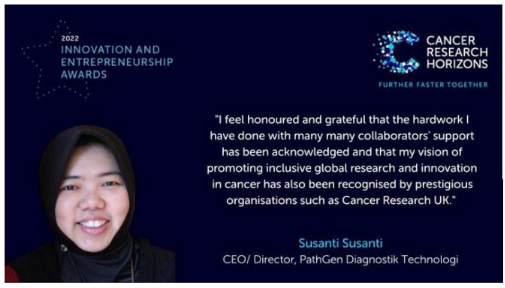Colo-MeltDx: An Affordable and Robust Molecular Diagnostics Tool for Colorectal Cancer
technology collects molecular data for best cancer management, supports precision medicine in
colorectal cancer, prevents over or under-treatment of patients, identifies people with hereditary
cancer, and detects recurrence at an early stage. The technology is expected to be integral to the
Indonesian market by utilizing Indonesia’s Universal Health Coverage known as BPJS (Badan
Penyelenggara Jaminan Social) to allow people to obtain the test without incurring any financial
strain. The lack of access to affordable and widely available molecular/genetic testing for cancer
patients in Indonesia results in over or under-treating of patients. The solution is a PCR-based
diagnostic kit developed with funding from the Islamic Development Bank (IsDB). The kit
incorporates six biomarkers, including microsatellite instability markers, to provide genetic
information for the best cancer Management. The technology is at least five times less
expensive than competing platforms
The Challenge
Colorectal cancer is a form of cancer that affects the rectum or colon (large intestine). It is caused by the uncontrolled growth of abnormal cells in the colon or rectum lining. This type of cancer can be fatal if not detected early. Every year, over 1.8 million people are diagnosed with colorectal cancer, and approximately 900,000 people die from the disease. In Indonesia, which is currently the 4th most populous country in the world, there are more than 35,000 patients diagnosed with colorectal cancer each year. It is the third most prevalent cancer worldwide, with a 4 – 5% strike probability and risk factors such as age, nutrition, lifestyle, genetics, and family history. Moreover, a diet that is high in red and processed meat, alcohol, and low in fiber can also increase the risk of colorectal cancer.
Detecting colorectal cancer in its early stages is critical for a successful outcome and regular screening can help detect the disease before it spreads and becomes more difficult to treat. However, genetic/ molecular tests that are used to detect and treat cancer are expensive and not widely available in Indonesia. The lack of access to affordable and widely available molecular/genetic testing for cancer patients in Indonesia results in over or under-treatment of patients. Due to the enormous costs and inappropriate use (55%), there is currently a heated debate in Indonesia about whether targeted medicines such as trastuzumab and cetuximab should be covered by universal health coverage. As a result, molecular diagnostics of predictive biomarkers are required to guarantee that targeted medication is used appropriately. Globally, the number of young persons (less than 50 years old) diagnosed with Early-Onset Colorectal Cancer (EOCRC), is increasing. If the present trends continue, the number of EOCRC cases will more than double by 2030 (Cercek et al, 2021). Surprisingly, EOCRC accounts for more than 35% of colorectal cancer in Indonesia, which is more than three times greater than in Western countries. This implies the impact of EOCRC on the Indonesian health systems is much higher.
The Solution
BioColoMelt-Dx is a PCR-based diagnostic kit developed with funding from the Islamic Development Bank (IsDB). It is specifically designed to tackle the challenges of colorectal cancer (CRC) among IsDB member countries, especially Indonesia. The kit incorporates six biomarkers, including microsatellite instability markers, to provide genetic information for the best cancer management. BioColoMelt-Dx is a simple, robust, and affordable diagnostic tool that can be easily integrated into existing health facilities. The technology is compatible with many types of real-time PCR machines, which are already widely available in Indonesia due to COVID-19 testing. Furthermore, the product is at least five times less expensive than competing platforms at USD $203 for 12 Biomarkers. Users simply dispense the PCR-mix in the PCR tube/strip, then load the sample to be tested. The result can be read after all the PCR-HRM process is done within approximately 2 hours. PathGen has signed an agreement with BioFarma, an Indonesian state-owned biotechnology company, as an industry partner to scale up and commercialize the diagnostic kit in Indonesia. Several hospitals in Indonesia have placed orders with Bio Farma and the product is currently being sold to hospitals, diagnostic labs, and research institutions. The technology is
expected to save more than £22 million in ineffective therapy, increase access, independence, and resilience of the local and regional market for molecular diagnostics of colorectal cancer and other diseases, and save at least 35,000 colorectal cancer patients in Indonesia and beyond per year. Furthermore, the technology will stimulate the local economy through the
commercialization of low-cost diagnostic tools and increase capacity in cancer genetics and molecular diagnostics within the Indonesian and international clinical and scientific communities.

Technology Transfer Potential
ColoMelt-Dx has been registered as a trademark in Indonesia. The kit received an IVD (In-vitro
Diagnostics) license from the Ministry of Health Republic of Indonesia under the number
KEMENKES RI AKD 20306220065 in collaboration with Bio Farma, the Indonesian producer and
distributor. In Indonesia, the device is presently extensively available for patient use. The primary
IPR (Intellectual Property Right) was granted to PathGen by the University of Nottingham, with Dr
Susanti as the lead inventor. Bio Farma is keen to disseminate the technology throughout the
world, particularly to IsDB member countries facing comparable issues